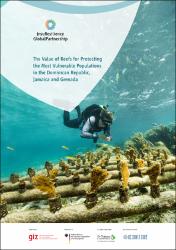/admin/item?itemID=6ed2651d-7b2f-4581-9c61-af8526bf8a55
The value of reefs for protecting the most vulnerable populations in the Dominican Republic, Jamaica and Grenada

Ver/
Tipo de acceso
AbiertoTipo de Material
ArtículoTipo de Contenido
Investigación científicaIdioma
InglésAudiencia
Técnicos, profesionales y científicosColección
- Investigación ambiental [1759]
Metadatos
Mostrar el registro completo del ítem| Sinopsis: | The aim of this study was to assess the flood protection benefits of reefs for protecting the most vulnerable people in the Dominican Republic (DR), Jamaica and Grenada. The study aims to support work on nature-based defenses and insurance by testing approaches for assessing connections between the benefits of nature-based defenses and socially vulnerable populations. We used hydrodynamic and socioeconomic models to compare flood risk and reef benefits for scenarios with and without reefs for four storm return periods including the 1 in 50-year storm. The without reefs scenarios assume only a decrease of 1m in the height and roughness of coral reefs. This work shows that – despite variations in the (sub)national data – we can quantify the social benefits provided by reefs for flood risk reduction. This quantification helps bolster the case for nature-based solutions and their role in climate adaptation and risk management as more than a “no-regret measure”. Restoring and managing coral reefs, quantifiably contributes to disaster risk reduction and livelihood improvement and should thus be included in national adaptation and disaster risk management plans, particularly in the tropical Small Island Developing States where nature-based solutions can be a critical element of coastal protection. |
| Autor(es): | Beck, Michael W.
Heck, Nadine Acosta, Montserrat Schill, Steve McNulty, Valerie Pfliegner, Kerstin |
| Año: | 2020 |
| Publicado: | Bonn: Deutsche Gesellschaft für Internationale Zusammenarbeit (GIZ) GmbH |
| Citación: | Beck, M. W., et al. (2020). The value of reefs for protecting the most vulnerable populations in the Dominican Republic, Jamaica and Grenada. Bonn: Deutsche Gesellschaft für Internationale Zusammenarbeit (GIZ) GmbH. Recuperado de: |
| URI: | https://bvearmb.do/handle/123456789/5393
|

